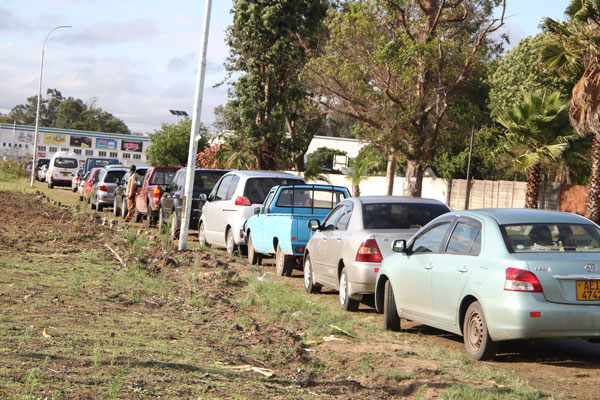
President Emmerson Mnangagwa’s government has given in to market forces and increased the price of fuel three-fold in a move set to trigger massive price and salary hikes and therefore, hyperinflation.
By Xolisani Ncube/ Phyllis Mbanje
Announcing the new price regime at State House last night, Mnangagwa said the decision was aimed at keeping fuel dealers viable.
“Following the persistent shortfall in the fuel market attributable to increased fuel usage in the economy and compounded by rampant illegal currency and fuel trading activities, government has today decided on the following corrective measures: With effect from midnight tonight, a fuel pump price of $3,11 per litre for diesel, and $3,31 per litre for petrol will come into effect,” Mnangagwa said.
The economy has been in serious downturn since Mnangagwa won last year’s presidential election, whose results have been rejected by MDC Alliance leader Nelson Chamisa.
Despite the prevailing parallel market rates, government had maintained that the bond note traded at par with the US dollar and kept fuel prices at $1,24 per litre for diesel and $1,32 per litre for petrol.
At the briefing Mnangagwa maintained that the official rate of the bond note and the US$ was 1:1. He also stated that foreigners, tourists, and embassies or international missions who produced identification would buy the fuel in hard currency at $1,24 diesel and $1,32 per litre for petrol at designated points.
Mnangagwa said he was also putting together a package to cushion civil servants until a full review of their salaries in April.
- Chamisa under fire over US$120K donation
- Mavhunga puts DeMbare into Chibuku quarterfinals
- Pension funds bet on Cabora Bassa oilfields
- Councils defy govt fire tender directive
Keep Reading
MDC spokesperson Jacob Mafume said Mnangagwa’s government had run out of ideas.
“They are bringing back the gory memories of 2008. He is now clueless. Officially he has run out ideas. Black market rates will go up. This is what we call a fallacy and indeed this regime is heartless to its people,” Mafume said last night.
Since Friday the fuel situation in the country had reached catastrophic levels with every fuel station swamped with desperate motorists while public transport operators had reacted by hiking fares several fold.
Long snaking queues had become the order of the day punctuated by chaos and outbursts of violence. There were several incidents of fist-fights among motorists and between motorists and staff at fuel outlets. Social media was awash with videos and pictures of people fighting and jostling to get in front of the queue.
In one video clip, fuel attendants are being beaten up by customers for allegedly charging in United States dollars. One attendant is seen being pulled by an angry mob which metes out instant justice before his colleagues manage to pull him to safety.
In another clip, a motorist is being dragged by uniformed military men and one of them actually bashes him with a truncheon as he resists orders to move his car.
At Puma’s Rhodesville outlet in Harare, tempers flared as some motorists cut corners and jumped the queue, attracting the wrath of frustrated fellow fuel hunters that had been patiently waiting their turn in the blazing sun and in some cases throughout the night.
A soldier who took it upon himself to control the queue could be seen grappling with impatient drivers. It was not clear if he had been sanctioned to do so or was also seeking an opportunity to fill up his car or maybe was just being the “good” citizen. Many people, however, did not appreciate his “service” and berated him for causing confusion.
“We are not in army barracks here. We are not your kids and we are quite capable of dealing with you,” said one driver as he drove off after being ordered off the line.
At Puma along Samora Machel Avenue in central Harare, the situation got out of control when government vehicles were allowed to jump the queue. Visibly agitated motorists became hostile and threatened to attack The Standard crew that was observing and recording the chaos on camera.
“We do not care who you work for, we will smash that camera if you take pictures of me,” said a middle-aged man who almost became physical with the team. So desperate had the situation become that many commuters were left stranded in various suburbs in Harare as the public transport operators withdrew their services either to join the queues at the service stations or to completely park their vehicles.
“Three of my ‘buses’ are in fuel queues while only one is still on the road, but soon it will be empty and I will be temporarily out of business,” said Shakeman Mashenjere, who owns commuter omnibuses that ply the Warren Park-Kuwadzana route.
He had been in the queue for many hours, but remained several kilometres away from the precious pumps which were dry anyway.
In Chitungwiza, the situation was dire as most service stations remained dry in the past few days. Nonetheless, long queues could be seen at every fuel station as motorists played games of luck in the hope of deliveries being made at the station of their choice.
One queue snaked from the Manyame bridge to a petrol station at CA, near St Mary’s police station, yesterday morning. At Trek service station along Seke Road (Chinhamo), the Chitungwizabound road was literally blocked as motorists jostled for positions.
The shortage of fuel has resulted in hundreds of commuters being stranded on the roads while the few commuter buses that had fuel were charging as much as $5 for a single trip from Chitungwiza to Harare.
On average these days, a trip into town from Chitungwiza now costs between $3-$4, while for other areas fares range between $1,50 and $2.










